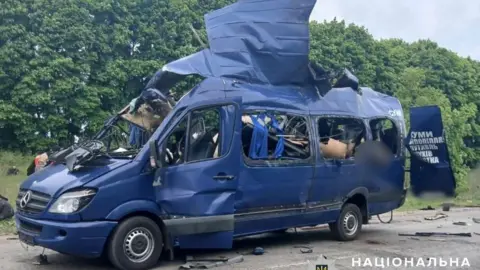On May 17, 2025, a tragic drone attack by Russian forces claimed the lives of nine civilians in a minibus traveling in northeastern Ukraine. The attack took place in Bilopillia—a town situated close to the regional capital of Sumy, near the border with Russia. Ukrainian officials reported that in addition to the fatalities, seven other individuals sustained injuries during this devastating incident, which occurred in the morning hours.
This brutal strike came just hours after pivotal peace discussions took place between Russia and Ukraine in Istanbul, marking the first direct negotiations between the two countries in over three years. Although the talks did not yield substantial progress towards peace, they included an agreement for a prisoner exchange, with each side set to return 1,000 imprisoned soldiers in the coming days. Ukrainian President Volodymyr Zelensky condemned the drone strike as a “deliberate killing of civilians,” highlighting the harrowing circumstances of the attack, wherein an entire family—including a mother, father, and their daughter—were among the casualties.
Sumy’s regional military head, Oleh Hryhorov, indicated that preliminary reports suggested the minibus was targeted by a Russian Lancet drone at approximately 6:17 AM local time. He characterized the assault as “inhumane,” stressing the apparent targeting of civilian vehicles. In response to this assault, President Zelensky called attention to the blatant disregard Russian forces displayed for civilian lives, asserting, “they could not help but understand what kind of vehicle they were hitting.” This latest attack reflects an ongoing pattern of violence amid the protracted conflict that began with Russia’s full-scale invasion of Ukraine in February 2022.
The backdrop of this tragedy includes the recent diplomatic efforts that took place on the previous day. While there was an acknowledgment of the need for a ceasefire, discussions in Istanbul highlighted the significant gulf that remains between the two nations regarding future negotiations. Ukraine has long maintained calls for a comprehensive and unconditional ceasefire but has found little willingness from Russia to engage substantively. As the specter of violence continues, the prospect of direct discussions between President Zelensky and Russian President Vladimir Putin looms as a potential avenue for de-escalation.
As the conflict persists, the United States has weighed in, suggesting that real progress may only come if President Donald Trump and Putin can meet face to face—a bold claim made during a recent trip through the Middle East. Trump emphasized the importance of personal dialogue, stating “nothing’s going to happen until [Putin and I] get together,” and voicing skepticism that any meaningful change could occur without such an engagement.
The situation in the Sumy region remains tense, with Ukraine employing this area to launch its own military offensives into the Russian-held Kursk region. Meanwhile, Russian forces have increased artillery strikes and drone attacks across the region, with prior drone strikes having caused several casualties just days before the Istanbul talks. In a retaliatory gesture earlier on the day of the drone attack, Ukrainian forces reportedly targeted an ammunition depot in Crimea—an area illegally annexed by Russia in 2014—resulting in significant explosions that may disrupt Russian logistics in the ongoing conflict.
Overall, this violent incident serves as a grim reminder of the human cost of war, particularly in a region where civilians have repeatedly found themselves caught in the crossfire of an enduring geopolitical struggle. This latest tragedy reflects the urgent need for robust and effective interventions to secure peace and prevent further loss of innocent lives. Keep an eye on this evolving situation as further developments unfold.



